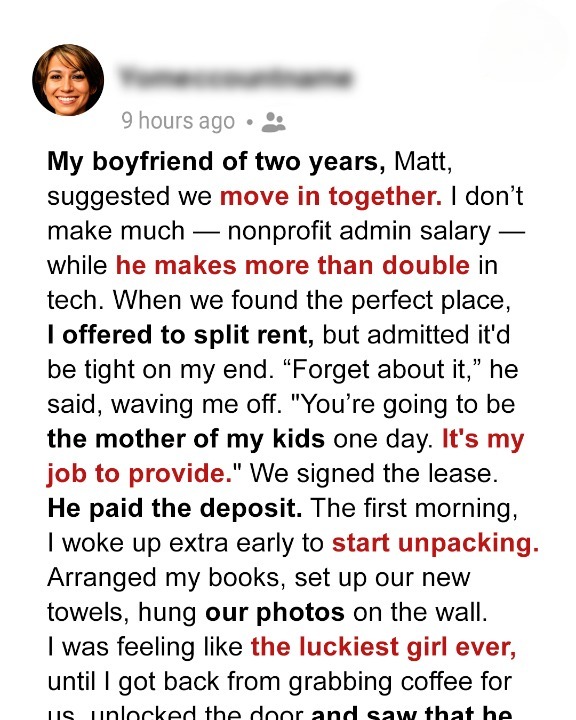The Hidden Cost of Generosity in Relationships

In modern relationships, grand gestures often appear as the ultimate expression of love. When a partner offers to take on financial responsibilities, it may seem like a selfless act of devotion—one that promises a secure future and mutual support.
However, beneath the surface of such generosity can lie a complex web of control, entitlement, and subtle manipulation. This narrative explores one woman’s experience when her boyfriend insisted on paying their rent. What began as a romantic gesture soon evolved into a means of control rather than an act of love.
The Illusion of a Dream
A Gesture of Love
When Matt first offered to cover the rent for their new apartment, it felt like something out of a romantic movie. His words, “Let me take care of you,” carried warmth and sincerity, making Alice feel cherished. After two years together, moving in seemed like the natural next step, a milestone in their shared future.
For Alice, the offer represented stability. It allowed her to focus on their relationship without the looming stress of financial strain. The idea of being cared for was alluring, and she saw it as an act of love rather than a shift in power dynamics.
The Unseen Consequences of Financial Dependence
Initially, the arrangement felt like a blessing, but over time, the subtle effects of financial imbalance became clear. While Matt’s high-paying tech job gave him financial freedom, Alice’s modest earnings from her nonprofit job left her with little flexibility. Though she offered to contribute, Matt dismissed the idea. “I want to take care of you,” he assured her.
What seemed like kindness soon took on a different tone. Decisions about their home, routines, and even how money was spent began falling into Matt’s hands. The power dynamics were shifting, and Alice was slowly losing her sense of autonomy.
Moving In: A New Chapter with Hidden Strings
A Space That Wasn’t Hers
Their new apartment—a cozy two-bedroom with hardwood floors and a small balcony—felt like the start of something wonderful. Alice was excited to make it their home. However, as she unpacked, she noticed that her belongings were shoved into a hall closet, while Matt’s items took center stage in the living space.
It was a subtle, yet telling, sign: the apartment may have been their home, but the space wasn’t truly hers.
The Fine Print Behind Generosity
At first, it was small things—Matt deciding on furniture without asking her opinion or dismissing her preferences in favor of his own. But gradually, his financial role became a tool for influence.
- If Alice wanted to invite friends over, Matt would remind her that he paid the rent.
- If she disagreed with a decision, he’d subtly suggest she had less say because she wasn’t contributing financially.
- Over time, Alice began feeling like a guest in her own home.
What started as an act of love became a quiet form of control—one that left Alice questioning whether financial dependence had come at the cost of her independence.
When Generosity Comes with Conditions
Alice’s story sheds light on an often-overlooked reality in relationships: financial dependence can lead to power imbalances, even when intentions seem good. True partnership isn’t about one person taking control—it’s about mutual respect, shared decisions, and ensuring that generosity doesn’t come at the expense of personal freedom.
This experience serves as a reminder that the gestures we accept in love should never come with invisible strings attached.